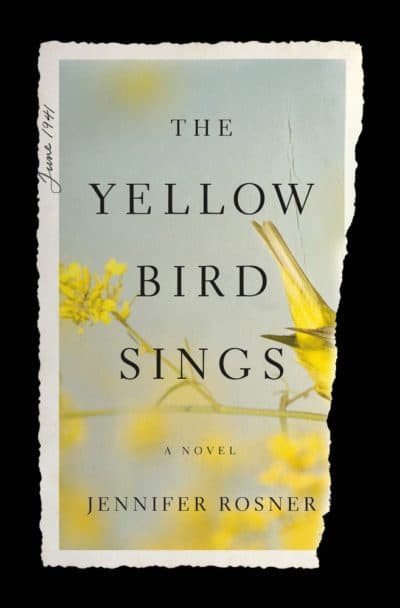Advertisement
Review
In 'The Yellow Bird Sings,' A Mother-Daughter Bond Is Tested In 1941 Poland
In Jennifer Rosner’s debut novel “The Yellow Bird Sings” the power of a mother-daughter bond is beautifully portrayed against the backdrop of 1941 Poland. Róża and 5-year-old Shira flee their hometown of Gracja, where Nazi soldiers dragged Róża's parents from their home and shot her husband Natan into a mass grave trench that he was forced to dig himself. A farmer and his wife grant Róża and Shira refuge in their barn, but they must remain silent and hidden so as not to alert suspicion from their neighbors. The life and death stakes paired with the intensity of a mother’s love makes you sit on the edge of your seat while the characters are confined to one place.

The necessity of quiet clashes with young Shira’s budding musical talent. Though she has not played instruments before, she grew up listening to Róża’s cello and Natan’s violin, so she constructs symphonies in her head from the everyday sounds surrounding her. In addition to dampening the rambunctious nature of a 5-year-old, Róża worries that Shira’s inclination to tap out rhythms will be their undoing.
The novel alternates perspectives between Róża and Shira. Readers gather the context and the severity of their circumstances through Róża’s worry. Then Shira’s confusion about their situation begs the question, how can you protect childhood innocence during wartime? Róża whispers stories about a yellow bird who sings on behalf of a little girl to help flowers grow. The girl herself has to keep quiet because the giants will stomp on her and her flowers. As Róża explains to Shira, “Some giants don’t like flowers, and because they believe the music in our voices helps the flowers grow, we must never let the giants hear our songs.”
The reason a Jewish mother must hide her daughter in a hayloft is because a fascist government cannot stand the unique metaphorical music Jewish culture brings to the fabric of society. “Róża only ever wanted Shira to feel pride in herself. Perhaps this is why she doesn’t tell her outright the reason they have to hide, why they are hunted. She’s not sure Shira would even understand if she tried to tell her.” Rosner’s prose sings the most when she filters the world through Shira’s musical mind. Despite the terrors Shira faces, Rosner shows how art — in addition to loved ones — makes life worth living.
For the most part throughout the novel, the threat of capture by Nazi soldiers implies life-threatening peril without Rosner explicitly writing about what would happen after their capture. With the rise of anti-Semitic hate crimes in recent years, this novel should be an obvious reminder that targeting citizens based on their religion, appearance or sexual orientation are human rights violations. Reading about this mother and daughter confined to a small space with irregular access to food and hygiene had me drawing comparisons to the conditions of migrant detention centers for modern-day asylum seekers in the U.S. Rosner invokes empathy for the parents who will do anything to protect their child when there are no easy answers for how to do so.

The novel is broken up into four major sections, each preceded by part of the story Róża tells Shira, as an allegory of what was to come for the pair. Months pass, as noted by the seasons and years in between chapters, and by the progress of Shira’s musical education. In addition to Róża’s stories and teachings of the alphabet, Shira clings to her mother’s hums of famous musical pieces. But their fraught time in the barn runs out. Rations are running low, Róża is fraught with guilt over sleeping with the farmer to extend their stay, and the final straw is when Nazi soldiers commandeer the barn for storage. Róża is back to square one and no place in town is safe for them to stowaway. How will young Shira survive a winter in the woods without shelter?
Rosner traverses the journey of their safety as if on top of a taught tightrope. The solution is one Róża approaches with heartbreaking uncertainty. Shira has the chance to enter a convent as an “orphan,” meaning she will be separated from Róża and forced to shed her Jewish identity. After losing the rest of her family, it goes against Róża’s every instinct to separate from Shira, even though she knows this is her best chance at survival. Little does she know that the stories she told Shira will be a source of resilience for them both.
As the nuns dye Shira’s dark hair, rename her as the Christian-sounding “Zosia” and teach her Catholic prayers, Róża is haunted by the discordant sounds of the hidden dangers in the woods and the spacious melody of her own anguish. She tries to summon stories of daisy chains to squash the feelings of regret over not finding a way to protect Shira by her side. Meanwhile, young Zosia is on a path to becoming a prodigy violin virtuoso, and she centers her mother at the heart of her passion.
Rosner sows seeds of hope and uncertainty for a page-turning conclusion. Both mother and daughter are in precarious scenarios where their safety could be compromised by an ill-timed raid by Nazi soldiers. But their desire to reunite guides them above all else and the power of music kindles a small spark of hope that they’ll find their way back to each other.
